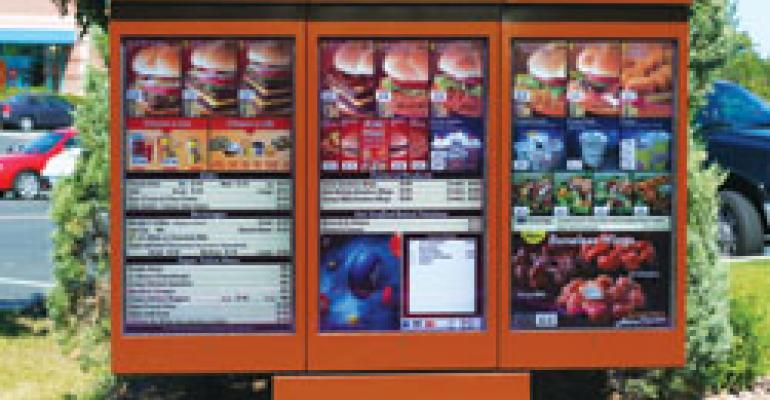• A comparison study of restaurant technologies found that consumers felt table-side displays of virtual menus with nutritional information to be the most valuable, followed by pagers for table management, hand-held point-of-sale terminals for line busting and online-reservations systems, said researchers for Ithaca, N.Y.-based Cornell University. Other technologies that scored well with the 1,737 consumers surveyed: virtual menus online with nutritional information; kiosk-based food ordering and payment; and online ordering.
• Digital menu and marketing boards turned up in eateries of all kinds. Rob Watkins, chief information officer for Compass Group North America of Charlotte, N.C., said some studies “have shown an uplift of over 20 percent in sales as well as significant increases in customer satisfaction when digital signage is deployed well.” He added that his company is “already beginning to see the value generated in the sites where we have rolled out the solution.” Concessionaires have been among early adopters, as have some national brands franchisee groups, like 76-unit Wendy’s operator Tar Heel Capital of Boone, N.C. Tar Heel has digital menu boards at 10 units and reported that items promoted using the technology have enjoyed a bump in sales of from 1 percent to 20 percent. The advent of case-enclosed, weather-protected digital signage for drive-thrus has enabled some operators, including 59-unit Wendy’s franchisee FourCrown Inc. of Oakdale, Minn., to use throughout some of its locations the technology supporting fast changes to menu descriptions, prices and images, as well as multimedia promotions.
• Data-network breaches and identity-theft cases caught the attention of many operators, and several chains said they would try a number of different technologies or services to better protect guest payment-card information in keeping with Payment Card Industry Data Security Standards, or PCI DSS. Roundtable Corp. of Dallas, a 50-plus-unit Dairy Queen franchisee, is using an in-restaurant hardware appliance supporting firewall, virtual private network, web filtering and content-control functions. The device can be augmented with a variety of services, such as PCI-required system scans. Back Bay Restaurant Group of Boston, with 34 casual-dining restaurants, is using a managed data gateway and four segregated wireless networks. Northborough, Mass.-based Bertucci’s Corp., operator of 94 Italian casual-dining restaurants, is protecting POS-system and enterprise software from malware by using technology based on “whitelisting,” or identifying and authorizing appropriate software and hardware for use with a specific system, while blocking others. Noodles & Company selected a centrally managed security technology for its 175 fast-casual restaurants that supports firewalls, deep-packet inspection, file integrity monitoring and log inspection. And nine-unit Applebee’s franchisee Porter Apple Co. of Sioux Falls, S.D., is working with a third-party service that supports tokenization, or the on-the-fly transfer of sensitive payment-card data from a restaurant’s POS system, where it might be vulnerable to hacking, to a virtual holding area with heightened security measures.
• North American consumers increasingly embraced self-service technology for ordering food, shopping checkout and ticketing, among other uses. But some quick-service restaurant owners still have qualms about deploying such devices, researchers indicated. IHL Group of Franklin, Tenn., in its 2009 North American Self-Service Kiosks study, estimates that transactions by North Americans using self-service kiosks or systems of all types will exceed $775 billion in 2009 and top $1.6 trillion annually by 2013. The operators seeing the upside potential of kiosks included contractor Delaware North of Buffalo, N.Y., and Aramark, which recently debuted at some college accounts the Burger Studio concept featuring touch-screen-ordering devices. Kiosks have been so well received at the first three branches of Wow Bao, Chicago-based Lettuce Entertain You Enterprises’ small square footage Chinese comfort food concept, that managing partner Geoff Alexander said the company will equip all future units with one POS terminal and two kiosks, which generate higher tickets than registers. Subway franchisee Rob Woodward will soon begin using a second-generation drive-thru kiosk at restaurants in Loveland, Colo., and Cheyenne, Wyo. He said his experience with kiosks at other units showed that they create a more efficient drive-thru experience, helping to boost sales, on average, 10 percent to 15 percent, and “differentiate our customer service.”
• Remotely hosted point-of-sale-system software for multiple locations that relies on centralized storage for restaurant-level-transaction data was given a vote of confidence by Aramark Higher Education, which serves about 400 campuses in North America. In 2009, AHE expanded the number of locations at which it used such POS technology to 23. Hard Rock Cafe of Orlando, Fla., was among the larger chains to pioneer the use of the technology. Aramark’s Dominic L. Boffa said centralized POS technology “provides us with increased information to manage our business, improves data standardization, gives us increased security as required by payment card industry rules, and it decreases the effort to deploy [systems] and train.”





